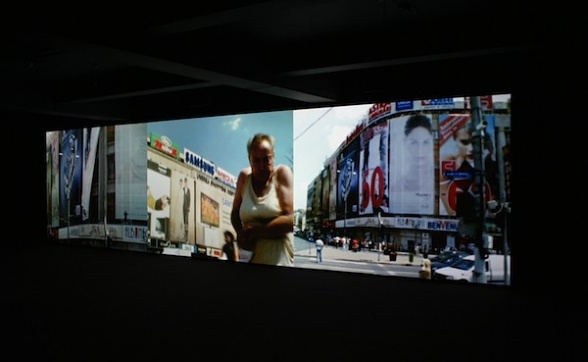Jesper Just
Jesper Just, Romantic Delusions (installation view), 2008
Plato’s Symposium explains human sexuality with an alternative creation myth. Humans, Plato tells us, were originally spherical creatures and came in three sexes – male, female or androgynous (male and female). Following an attempt to overthrow the gods, Jupiter punished these creatures by splitting them in two, condemning them to an eternal search to be reunited with their other half. Human sexuality, in Plato’s story, is the primal longing once again to become whole, and is determined by our original sex – homosexuals being once male, lesbians female, or heterosexuals androgynous – half man and half woman.
In his work for MADE UP entitled Romantic Delusions (2008), Jesper Just (b. 1974 Copenhagen) explored humanity’s longing for union, and the inevitable frictions that haunt the meeting of opposites. The central character of the film, a hermaphrodite, belonged neither to the world of the feminine or masculine. Just’s rich filmic narrative revealed the increasing isolation and alienation experienced by the protagonist as he/she searched for a sense of belonging. Filmed in Bucharest and Constanza (Romania), the architectural setting mimicked and heightened the internal discord of the protagonist. The frivolity of European baroque set alongside buildings in the more brutal communist idiom enacted an uncomfortable encounter between West and East, Capitalism and Communism.
The hermaphrodite is a natural subject for Just, whose dark ambiguous narratives reveal the complexity of human relationships and gender roles. In films such as Invitation to Love (2003), The Lonely Villa (2004) or Bliss and Heaven (2004), traditional masculine preserves – boardrooms, gentlemen’s clubs, trucks – are transformed into sites for highly incongruous and emotionally charged displays, as men sing, dance and weep openly in front of one another. Just’s films play on both the conventions of Hollywood films and society in general, to reveal men to be anything but men in the stereotypical sense of the word. In his frequent use of cliches to title his work, Just playfully acknowledges the stereotypes his work explores. It will all end in tears (2006) does literally end in tears, but in Just’s exploration of the relationship between a middle aged man and a young boy, the comforting certainty of a hackneyed phrase quickly dissolves into a disturbing psychological portrait.
In these earlier films, the choice of setting is key to constructing expectations which Just goes on to confound. In more recent work, the architecture has become a palpable presence, taking on what is tantamount to a speaking role in films which are notable for the almost complete absence of dialogue. In A Vicious Undertow (2007), an entire story of desire and longing grows almost imperceptibly out of an introductory close-up of a Chinoiserie tapestry.
Romantic Delusions (2008) expanded the role of architecture still further. The clash of architectural style (and by implication, ideology) extended the metaphor beyond the internal world of the hermaphrodite to encompass the social and political. Just suggested that in the political, as much as the personal, we delude ourselves with romantic dreams of blissful unions.
Jesper Just at Liverpool Biennial 2008
Romantic Delusions, 2008
8mm film, duration 10 min 25 seconds
Commissioned by Liverpool Biennial 2008, Galleri Christina Wilson and Galerie Emmanuel Perrotin
Exhibited at Rapid Paint Shop
Supported by
Northwest Regional Development Agency
Calouste Gulbenkian Foundation
The Danish Arts Council
Embassy of Denmark, London
The Danish Cultural Institute
U-Turn Quadrennial for Contemporary Art
Liverpool Biennial
55 New Bird Street
Liverpool L1 0BW
- T +44 (0)151 709 7444
- info@biennial.com
Liverpool Biennial is funded by
Founding Supporter
James Moores
